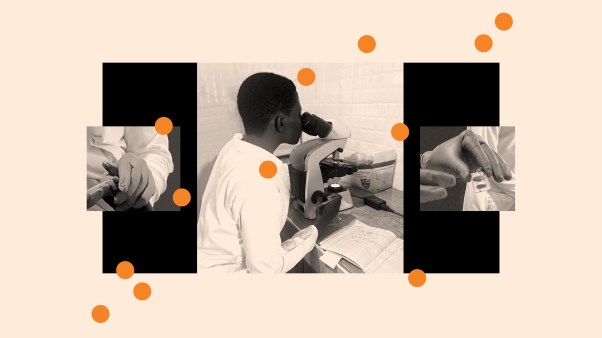In a small thrift store tucked next to a motel near a California interstate, Will wrestles a duct-taped vacuum cleaner out of its box. He has worked at the thrift store for two months—the same amount of time that he’s been sober and has lived at the Inside Out Men’s Home, a rehabilitation center for chronic alcohol and drug abusers.
Will speaks carefully about the decisions he made before coming to Inside Out. “I chose alcohol over her,” he says, when asked about his gold wedding band. “But I never touched her. I never did that.”
“She said she didn’t want to see me anymore,” he adds. “But she hasn’t moved or changed her phone number.”
Will has kids, too—and hope for getting his life back on track.
Main Place Christian Fellowship, which operates the thrift store in Tustin, California, and the rehabilitation center in nearby Santa Ana, traffics in the hope that encourages Will to try to change his life. As a plant of Saddleback Church 20 years ago, Main Place’s ministry has burgeoned, planting seven churches of its own and expecting to birth a dozen more by 2020, says pastor Rich Mathisrud. As a church planter, Main Place spends much of its time running businesses to locate and serve the downtrodden. Its church-planting abilities surprisingly come from starting nonprofit businesses.
“We want to use resources to reach as many people as possible,” says Mathisrud. “We’re just a little church with a big vision trying to honor our great God.”
In two decades, Main Place has started a total of six businesses in Orange County and planted seven churches. Its businesses include the thrift store, half of which sells office supplies; a bookstore; an elementary school; and two theaters, Curtain Call Dinner Theater and, most recently, the Village Theater. Its seven churches are scattered across the West Coast in Tustin, Irvine, Orange, Garden Grove, Santa Ana, and Los Angeles, California, and in Tijuana, Mexico. Main Place’s businesses invest in alcohol- and drug-addicted men to provide the finances necessary for church planting and community work; then it puts its profits back into some of the most crime-filled communities in the county. Is this any way to run a church? Actually, it is.
Setting the Trend
The Christian Community Development Association (CCDA), whose main offices are located in Chicago, is the guiding organization for Main Place and 600 similar efforts in 200 cities and 40 states across the country. The named “grandfather” of CCDA is longtime social-justice worker John M. Perkins (see “Grandpa John,” CT, March 2007). Since the 1960s, Perkins and his wife, Vera Mae, have served the poor in their Mississippi backyard and elsewhere, eventually helping found the CCDA in 1989.
“We champion a clear obedience to the gospel,” Perkins says, quoting James’s injunction to “visit the widows and orphans” as a shorthand mission statement for CCDA. The ultimate goal of the association, Perkins says, is to follow “the Great Commandments and the Great Commission”—to love God and neighbor by bringing the gospel of one to the other at the grassroots level. In obedience to this goal, a CCDA organization may or may not plant a church, but it will likely start one or more businesses to fuel community outreach and growth.
Main Place manages to do both. Pastor Mathisrud says the church wasn’t trying to start a business, let alone six; it just wanted to help.
A burly man named Dave, with tattoos up one arm and down the other, operates Main Place’s thrift store. As a manager, Dave has already finished the Inside Out rehabilitation program; in Main Place parlance, he’s a graduate.
The thrift store and the men’s home function symbiotically: the residents of the latter are often employed at the former. Proceeds from the shop, added to profits from Main Place’s small bookstore and elementary school, cover the cost of feeding and housing a dozen men at a time.
Inside Out sits on two adjacent parcels in a residential area of Santa Ana. Officially, it’s a “loving care” facility—a city term, Mathisrud says. Residents pay nothing to live there, but like Will, they may work at the thrift store.
Mathisrud says it costs $7,500 a year to support each resident, depending on medical and dental coverage and potential court fees. The men in the program commit to one year of residency. By the time they graduate, they will have saved at least $1,000 and are ready to go out on their own. But many who complete the program stay on at the thrift store and help new residents.
One Inside Out graduate bought a carpet-cleaning business from the church and now pastors Main Place’s church plant in Garden Grove. Mike Ferrin, earning $200,000 a year at Color Tech Carpet Restoration, leads the small congregation in the same high-crime, low-income area where he used to score drugs. He wants to move into full-time ministry.
Role Models
Three years ago, Main Place caught the acting bug and bought the formerly named Elizabeth Howard Curtain Call Dinner Theater, now known as Curtain Call. Founder Elizabeth Howard had turned the theater into a Tustin institution before she retired. Mathisrud good-naturedly pestered Howard for years to let him hold a Sunday brunch at the theater, and she steadfastly refused. But when she retired, Howard finally sold Mathisrud the theater.
Having a church run the city’s beloved theater worried some patrons. When the theater changed hands in 2005, Curtain Call continued its standard dinner fare, but no longer served beer and wine.
“As a church, we felt we couldn’t serve alcohol when the reason we’re doing plays is to help men addicted to it,” Mathisrud says.
Adele Hirschfield and her husband, Lewis, often attended plays prior to Main Place taking the reins. Since then, the Hirschfields went twice—and enjoyed it. “The show was just as good as ever and the meal was excellent,” she says. “The service was fine.”
Recently Main Place leased a second venue in nearby Orange. The Village Theater may become the new meeting place for Pastor Rich’s congregation. It will also produce plays—”Everything Biblical to Broadway,” as a banner over the theater’s sign proclaims. Main Place is renovating the new site and has a 10-year lease. The building’s neighbors are excited about the new owners—especially a restaurant eager to discuss how it can work with the church.
The Old Rugged Cross
On the wall behind the registers at the thrift store hangs a large wooden cross, four or five feet tall. It’s large and sturdy enough to hold the sins of those who write their confessions on pieces of paper and nail them to the wooden beams. Write your sins on the paper, nail them to the cross, and walk away.
“It’s for anybody who comes in,” says Doug Hellman, a store employee. “It’s loud, too. You get one person nailing, and pretty soon you’ve got a line of people.”
Hellman says the thrift store is an “ideal spot” for outreach because of the motel that surrounds it—a hotbed of drug dealing and prostitution. “This place needs a police substation,” he says. “It can be bad. We see it all the time.” Hellman himself stayed in the motel the week before he came to Christ and started living at the men’s home.
But in spite of the neighborhood, or perhaps because of it, “it’s perfect for us,” Hellman says. “They shop here, and we get a chance to witness to them.”
This is Christian community development in microcosm, as it plays out on one 100-yard stretch of road in one town in Orange County and in the lives of individuals like Will, whose simple work in the thrift store speaks of his hope to put his life back together.
Paul Hughes is a writer in Southern California.
Copyright © 2008 Christianity Today. Click for reprint information.
Related Elsewhere:
“IRS Rules to Remember,” which accompanies this article in the March issue, has tips for churches who hope to run businesses.
More articles about business and missions are available on our site.









